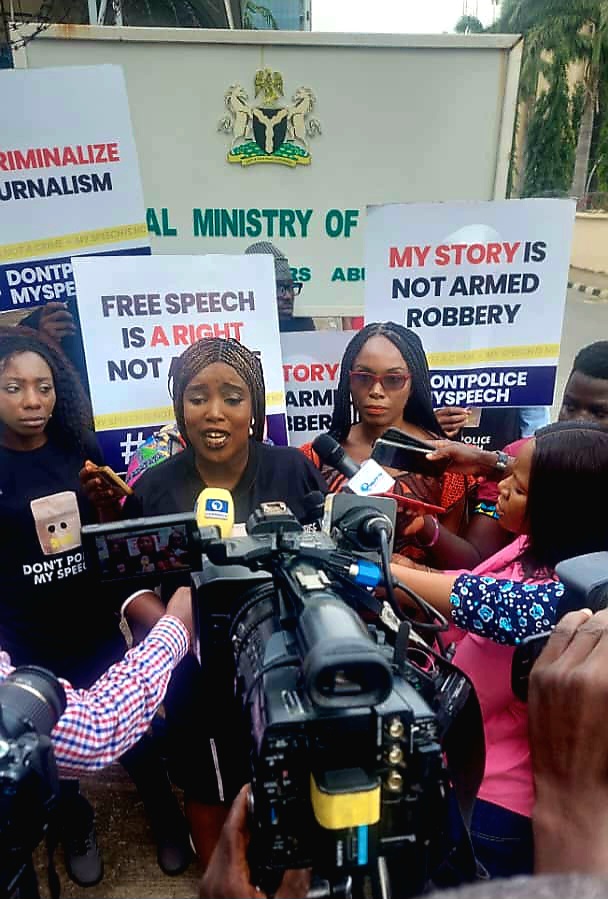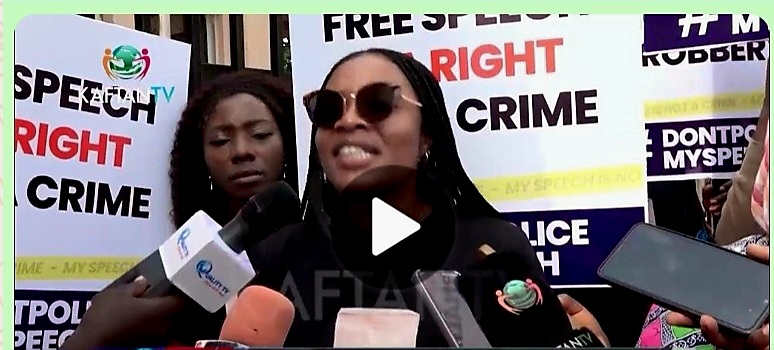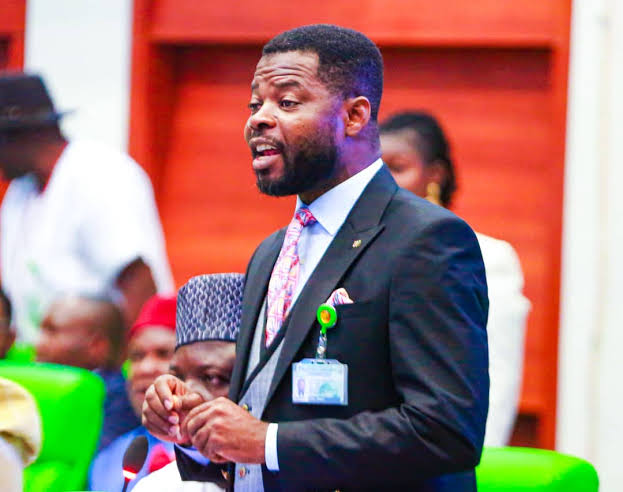Reps Investigates Crackdown on Journalists in Nigeria Amid #DontPoliceMySpeech Campaign
The protest, a testament to the power of unity and collective action, sent a clear message to the government: that the intimidation and harassment of journalists will no longer be tolerated. The arbitrary arrests, detentions, and harassment of journalists have become all too familiar in Nigeria, with many facing trumped-up charges and intimidation tactics for simply doing their job.
By Collins Odigie Ojiehanor
In a significant development coinciding with the recent #DontPoliceMySpeech campaign, the Nigerian House of Representatives has resolved to investigate the alleged arbitrary arrest and detention of journalists by security agencies.
The protest, led by three female advocates with the Lead Advocates from Gatefield, Shirley Ewang, the Converner of African Women in Global Leadership and Executive Director of LightRay! Media, “Lady E” Ejiro Umukoro, and Digital Media Legal Expert Mojirayo Ogunlana-Nkanga, supported by over 200 other media organisations and CSOs including Accountability Lab Nigeria, Dataphyte Foundation, Humangle Media, Tap Initiative, DigiCivic Initiative, Follow Taxes, More Branches, Femme Mag, Paradigm Initiative, Invictus Africa, Marie Claire Nigeria, and Document Women highlighted the urgent need to address the misuse of the Cybercrimes Act against journalists and citizens.
The rally saw a substantial turnout, particularly of young female journalists alongside their male counterparts, emphasizing the growing commitment to press freedom and women’s advocacy within the media landscape.
A Resounding Call for Justice
The #DontPoliceMySpeech campaign drew attention to numerous cases of journalists facing harassment, assault, illegal arrest, detention, and intimidation. Notable incidents include the detention of Gabriel Idibia and Daniel Ojukwu for their journalistic activities and the police declaration of Fisayo Soyombo, Editor-in-Chief of the Foundation for Investigative Journalism (FIJ), as a ‘wanted person’ by the police. These actions have sparked outrage among rights activists and civil society organizations, who view them as direct assaults on democracy and free speech.

During the protest, Lady Ejiro Umukoro passionately condemned the misuse of the Cybercrimes Act, stressing that gagging the press sends the wrong signal about Nigeria’s commitment to democracy. “The abuse of the Cybercrime Law as a tool to censor, gag, control, deny, abuse, and harass citizens and journalists alike is unconscionable. More so when journalists are risking their lives in the line of duty to inform and protect both citizens and those in power or leadership,” she stated.
Umukoro passionately condemned the misuse of the Cybercrimes Act, stressing that gagging the press sends the wrong signal about Nigeria’s commitment to democracy. “If we don’t have journalists, then we don’t have a democracy,” Umukoro stated emphatically. “And if Nigeria says we have democracy, then we need to act it, we need to be it, and we need to become it.”
She elaborated on the concept of the “four estates,” highlighting the interconnectedness of journalism with other arms of governance. “When you think about it, the legislator, the judiciary, the executive, and then the journalists make up the four estates that we have in Nigeria, same as across the globe. Without these four estates, there is no government, there is no governance, and so we are all interconnected.”
Umukoro called for mutual respect between journalists and other branches of government, stressing that journalists deserve the same level of respect as the executive demands. “There must be a respect, the same way the executive demands respect; so, it is the same level of respect that should be given to journalists,” she concluded
Shirley Ewang of Gatefield calling on Nigerian leaders to uphold and safeguard the fundamental rights to freedom of expression and speech, clearly stated that: “We’re here to ask our leaders to do better, safeguard our fundamental rights to freedom of expression, safeguard our fundamental rights to freedom of speech,” Ewang declared. “That way, we’re able to ensure that there’s transparency and accountability of the government. And I think that that’s why we’re all here today.”
Ewang emphasized that the issue transcends individual organizations and affects all Nigerian citizens. “It’s not just about Gatefield. It’s not just about civil society organizations. But I think it’s important for every Nigerian citizen to understand that our freedom of speech is currently being policed.”

She urged all Nigerians to rise and join the fight for freedom of expression in the country. “Rise and join the fight for freedom of expression in Nigeria today,” Ewang concluded, rallying support for this essential democratic right.
Legislative Action and Probing Abuses
In a related development, Rep. Clement Jimbo (APC-Akwa Ibom) introduced a motion at the House of Representatives to probe the alleged arbitrary arrests and detentions. The House, recognizing the fundamental right to press freedom enshrined in Section 39(1) of the 1999 Constitution, adopted the motion. Jimbo emphasized that the escalating harassment of journalists threatens democracy and undermines the essential role of the media in holding the government accountable.
The probe aims to address the increasing incidents of journalists being unlawfully arrested and detained under the guise of cyber-stalking offenses. Jimbo highlighted that, despite amendments to the Cybercrimes Act, security agencies continue to misuse Section 24 to clamp down on free speech. He warned that such actions contribute to Nigeria’s poor international reputation regarding press freedom, as noted by Reporters Without Borders (RSF).

Towards Accountability
The House’s resolution to investigate these abuses is a significant step towards ensuring accountability and upholding the rights of journalists. The lawmakers underscored the importance of protecting journalists’ rights for democracy and the principles of free speech and human rights. They called on law enforcement agencies to rely on the amended Cybercrimes Act and charge any alleged offenders in court, rather than resorting to arbitrary arrests and detentions.
The Speaker of the House, Rep. Tajudeen Abbas, mandated the Committee on National Security to ensure compliance with this resolution, signaling a commitment to safeguarding press freedom in Nigeria.
Echoes of the #EndSARS Movement
The protest and subsequent legislative action also resonate with the recent ruling by the ECOWAS Court, which found the Nigerian government guilty of violating the rights of youths during the October 2020 #EndSARS protests. The court’s ruling, which mandates compensation for victims of the Lekki Toll Gate incident, underscores the need for accountability in the use of force against peaceful demonstrators and journalists alike.
The House of Representatives’ decision to probe the arbitrary arrests of journalists marks a critical juncture in the fight for press freedom in Nigeria. As the #DontPoliceMySpeech campaign continues to gain momentum, it is hoped that these efforts will lead to tangible changes in the protection of journalists’ rights and the promotion of free expression.
The coalition of journalists, activists, and civil society organizations remains steadfast in their demand for justice, accountability, and the upholding of fundamental rights in Nigeria’s democratic landscape.





Comments